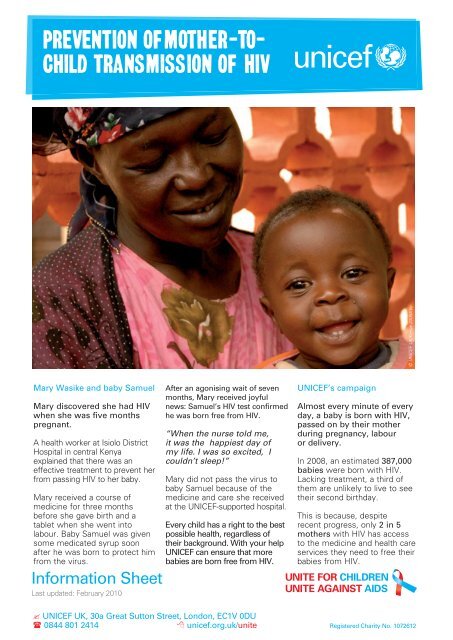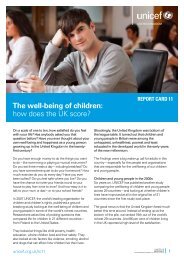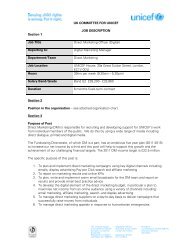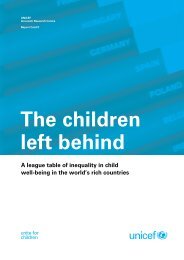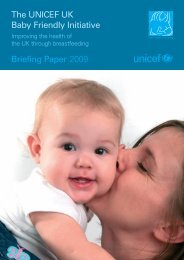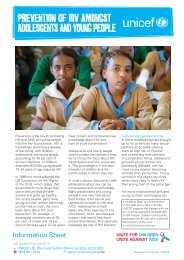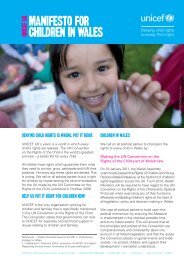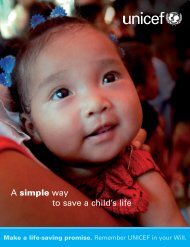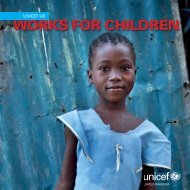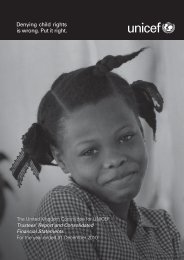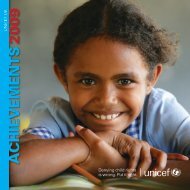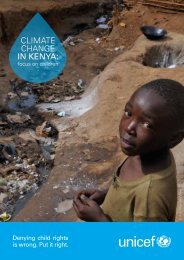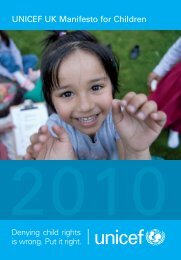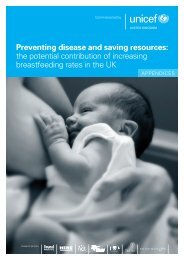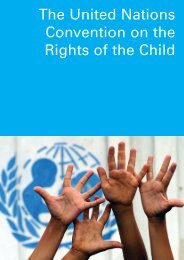prevention oFmother-to- child transmission oF hiv - Unicef UK
prevention oFmother-to- child transmission oF hiv - Unicef UK
prevention oFmother-to- child transmission oF hiv - Unicef UK
Create successful ePaper yourself
Turn your PDF publications into a flip-book with our unique Google optimized e-Paper software.
<strong>prevention</strong> <strong><strong>oF</strong>mother</strong>-<strong>to</strong><strong>child</strong><br />
<strong>transmission</strong> of <strong>hiv</strong><br />
© UNICEF <strong>UK</strong>/Kenya 2006/Irby<br />
Mary Wasike and baby Samuel<br />
Mary discovered she had HIV<br />
when she was five months<br />
pregnant.<br />
A health worker at Isiolo District<br />
Hospital in central Kenya<br />
explained that there was an<br />
effective treatment <strong>to</strong> prevent her<br />
from passing HIV <strong>to</strong> her baby.<br />
Mary received a course of<br />
medicine for three months<br />
before she gave birth and a<br />
tablet when she went in<strong>to</strong><br />
labour. Baby Samuel was given<br />
some medicated syrup soon<br />
after he was born <strong>to</strong> protect him<br />
from the virus.<br />
Information Sheet<br />
Last updated: February 2010<br />
After an agonising wait of seven<br />
months, Mary received joyful<br />
news: Samuel’s HIV test confirmed<br />
he was born free from HIV.<br />
“When the nurse <strong>to</strong>ld me,<br />
it was the happiest day of<br />
my life. I was so excited, I<br />
couldn’t sleep!”<br />
Mary did not pass the virus <strong>to</strong><br />
baby Samuel because of the<br />
medicine and care she received<br />
at the UNICEF-supported hospital.<br />
Every <strong>child</strong> has a right <strong>to</strong> the best<br />
possible health, regardless of<br />
their background. With your help<br />
UNICEF can ensure that more<br />
babies are born free from HIV.<br />
UNICEF’s campaign<br />
Almost every minute of every<br />
day, a baby is born with HIV,<br />
passed on by their mother<br />
during pregnancy, labour<br />
or delivery.<br />
In 2008, an estimated 387,000<br />
babies were born with HIV.<br />
Lacking treatment, a third of<br />
them are unlikely <strong>to</strong> live <strong>to</strong> see<br />
their second birthday.<br />
This is because, despite<br />
recent progress, only 2 in 5<br />
mothers with HIV has access<br />
<strong>to</strong> the medicine and health care<br />
services they need <strong>to</strong> free their<br />
babies from HIV.<br />
? UNICEF <strong>UK</strong>, 30a Great Sut<strong>to</strong>n Street, London, EC1V 0DU<br />
( 0844 801 2414 8 unicef.org.uk/unite Registered Charity No. 1072612
To protect the right of all <strong>child</strong>ren<br />
<strong>to</strong> the best possible health,<br />
UNICEF is campaigning <strong>to</strong> ensure<br />
that all pregnant women with HIV<br />
receive the right medicine and<br />
care <strong>to</strong> prevent them passing HIV<br />
on<strong>to</strong> their baby.<br />
Given this medicine and care,<br />
the chance that a mother with<br />
HIV will pass the virus <strong>to</strong> her<br />
baby drops <strong>to</strong> less than 1 in 50.<br />
UNICEF’s Unite for Children,<br />
Unite against AIDS campaign<br />
aims <strong>to</strong> provide medicine and<br />
care for all mothers and babies.<br />
Mother-<strong>to</strong>-<strong>child</strong> <strong>transmission</strong><br />
Without the services <strong>to</strong> prevent<br />
mother-<strong>to</strong>-<strong>child</strong> <strong>transmission</strong> of<br />
HIV (PMTCT), about one-third<br />
of women with HIV will pass the<br />
virus <strong>to</strong> her baby. Given proper<br />
PMTCT services, this risk can be<br />
reduced <strong>to</strong> less than 2 per cent.<br />
PMTCT services include<br />
counselling, medicine and testing<br />
for HIV. Mothers with HIV receive<br />
a course of anti-retroviral medicine<br />
<strong>to</strong> take before birth and then a<br />
tablet with the onset of labour.<br />
When the mother has given birth,<br />
the baby is given medicated syrup.<br />
In addition, mothers are counselled<br />
on infant-feeding options <strong>to</strong> reduce<br />
the risk of <strong>transmission</strong> through<br />
breastfeeding.<br />
UNICEF believes that mothers<br />
with HIV need more than just<br />
the medical treatment and care<br />
that prevents them passing the<br />
virus <strong>to</strong> their babies. It is vital <strong>to</strong><br />
provide ongoing treatment and<br />
care, so that the baby that is<br />
born free does not grow up<br />
an orphan.<br />
To this end, we support the<br />
development of PMTCT services<br />
as a starting point for providing<br />
treatment, care and support <strong>to</strong><br />
whole families.<br />
Preventing mother-<strong>to</strong>-<strong>child</strong><br />
<strong>transmission</strong> of HIV is one of<br />
the four main aims of our Unite<br />
for Children, Unite against AIDS<br />
campaign.<br />
Five-year-old Kel<strong>to</strong>n holds his four-week-old brother, Elson. His mother, Inonge, learned<br />
she was HIV-positive while pregnant with Elson. She participates in a PMTCT programme<br />
which provides Elson with preventative medication and will administer his first HIV test<br />
when he is six weeks old. © UNICEF/NYHQ2009-0731/Nesbitt<br />
The other aims are:<br />
m Provide paediatric treatment<br />
Worldwide, all <strong>child</strong>ren with<br />
HIV must receive <strong>child</strong>friendly<br />
medicine.<br />
m Prevent HIV among young<br />
people<br />
Young people, especially<br />
young women, are the most<br />
vulnerable <strong>to</strong> HIV. We need<br />
<strong>to</strong> empower young people by<br />
providing them with the facts<br />
about HIV.<br />
m Protect and support orphans<br />
and other <strong>child</strong>ren made<br />
vulnerable by HIV and AIDS<br />
The 17.5 million <strong>child</strong>ren<br />
orphaned because of AIDS<br />
need <strong>to</strong> receive protection,<br />
care and support.<br />
What you can do<br />
Fulfilling the rights of every<br />
<strong>child</strong> means ensuring that HIV<br />
and AIDS is not allowed <strong>to</strong><br />
reverse the progress we have<br />
already made for <strong>child</strong>ren. We<br />
need your help <strong>to</strong> reach the<br />
most remote and marginalised<br />
<strong>to</strong> ensure that every <strong>child</strong> has<br />
the best possible start in life.<br />
Denying <strong>child</strong> rights is wrong.<br />
Campaign, donate or raise<br />
money and help us put it right.<br />
To find out more, please visit<br />
unicef.org.uk/unite<br />
UNICEF is funded entirely<br />
through voluntary donations.<br />
While we are part of the United<br />
Nations family we are not<br />
funded from the UN budget.<br />
? UNICEF <strong>UK</strong>, 30a Great Sut<strong>to</strong>n Street, London, EC1V 0DU ( 0844 801 2414 8 www.unicef.org.uk/unite


